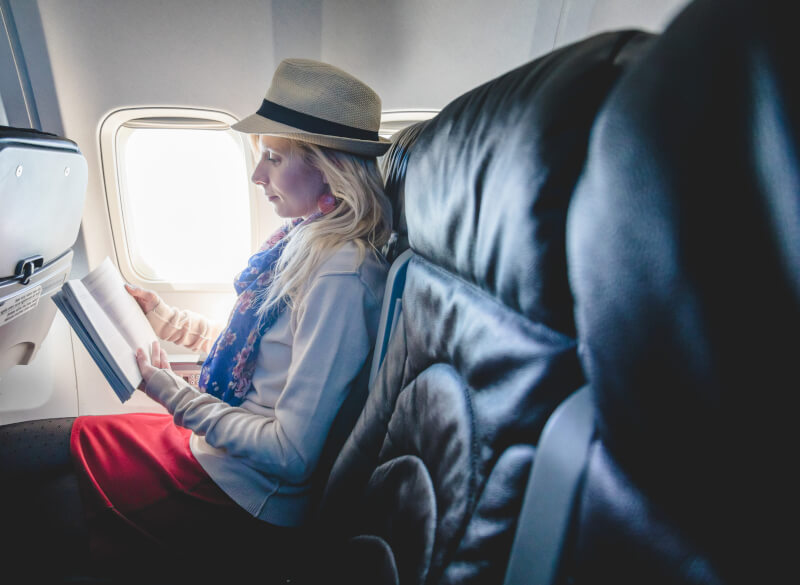Maybe you’re one of those people who just seems to have no problem navigating major airports like New York’s JFK or London’s Heathrow. Perhaps you’ve heard some terrible stories about customs or the idea of checking in makes you nervous. But what if you’ve never checked in at an airport or flown commercially by yourself before?
Your first time flying solo before your tour begins can be as smooth as silk with just a little bit of planning ahead of time. We guarantee that you will be navigating the terminal with ease after reading our list of suggestions.
Get Your Stuff Together Early
Unfortunately, we are all too familiar with the reality that unexpected events can force you to pack at the last minute. Packing a week (or even two) before your journey will put you in a much more composed state of mind, reducing the likelihood that you will forget anything essential. You may ensure that you are fully prepared for your trip by making a comprehensive list of all the items you will need one month before your departure. The weight limit for checked bags and the airline’s regulations for carry-ons should be carefully reviewed. A high cost for carrying one or two excess kilograms is the last thing you need before meeting your tour group.
Make Sure to Check the Expiration Date of Your Passport
Even seasoned travelers sometimes make the rookie error of forgetting their passport’s expiration date. To avoid any unpleasant surprises at the airport, it is a good idea to check the expiration date of your passport as soon as you consider purchasing your flight or trip. Typically, a minimum validity period of six months is necessary, though this does vary by destination.
Double-check Your Schedule
Even though it’s human nature to make a few blunders here and there, reviewing your travel plans in the days leading up to your departure will help you avoid showing up at the airport on the incorrect day. Get a friend to double-check your itinerary in case you have any doubts about the times or dates. You can check in online up to one day before your travel.
Modern online check-ins typically take no more than five to ten minutes. This can be your chance to get a much better deal on your flight with certain carriers. Get psyched about your trip by picking out your food, personalizing your entertainment, and selecting your seat. After everything is taken care of, either save a copy of your boarding pass in a safe location or download the digital version to your phone.
Keep Your Liquids in Order
Worldwide flights must adhere to the following liquid limits: 100 ml per container; each bottle must fit into a 1-liter plastic bag. To make sure you don’t get any unpleasant surprises at airport security, double-check the sizes of your sunscreen, perfume, moisturizer, face lotion, and liquid foundation.
Wear Loose-fitting Clothing
You must be well-prepared for your first solo airport adventure. Wear shoes that are easy to remove when passing through security, and don’t wear too many heavy layers—you might be asked to remove each one. Stylish sweaters for women and cozy fleece sweatshirts for men are available here; the former is ideal for those long days spent traveling.
Get There Before a Minimum of 2 Hours Early
At least two hours (or three hours for foreign departures) before your flight’s scheduled departure time is the suggested time to arrive at the airport. This may seem like a lot of time to wait before your trip, but it’s preferable to be extra careful in this situation. You may drop your bags, walk through security, get food, and locate your gate if you get there nice and early. The cutoff time for check-ins varies from 30 to 60 minutes before departure, although it is usually enforced by most airlines.
Do not be shy about informing the airport personnel that this is your first time traveling alone if you are a first-time passenger. Bear in mind that their purpose is to assist you. If you let them know that you’re completely confused about what to do and where to go, they should be able to calm your nerves by walking you through everything.
Always Be Cautious With Your Passport
Your passport must remain in the designated area of your luggage, purse, or front pocket at all times. Take it off only when necessary, and keep it close at all times when passing through security.
Know What to Expect at Airport Security
Depending on the airport’s volume of passengers, security checks can take anything from a few minutes to an hour. Be ready to follow the regulations of the security screening to keep the line moving. Make sure you have your boarding card and passport on hand, empty your water bottle, and be prepared to remove your shoes, belt, and bulky garments if requested before you join the queue.
As you approach the security line, take out your electronic devices, including your phone, tablet, and computer, and put any tiny liquids in the designated screening container. When you bring your bag in for screening, make sure to put it in its own designated tray. Wait calmly for your turn to pass through the metal detector so that you can have a body scan while your belongings go through the screening conveyor belt. After going through security, all you have to do is gather your belongings (make sure your passport is with you) and head to your boarding gate.
Things to Do When Boarding
Show Up Promptly at the Gate
Now that you’ve made it through the airport’s busiest areas, you can relax. The last thing you need to do is look at your boarding pass; it will tell you when boarding will start and which gate your flight will take off from. The big boards that show when flights take off will also alert you if there are any last-minute adjustments to your gate or departure time. The speaker system will also announce any changes.
Now all you have to do is listen for the boarding lineups, assuming you’re already at the gate and ready to board. You may be called by your row number or your boarding group, which is often indicated as zones 1–8, or group A–D, by the gate attendant. People who are traveling with little children or who require wheelchair help will most likely be contacted first.
Things to Do While in Flight
Upon boarding the aircraft, members of the flight attendant staff will show you where your seat is. Before you settle in for the ride, make sure everyone else can pass by by stepping out of the aisle and placing your bags in the overhead bin.
Benefits Of Solo Travel
From the moment you step into the airport, you are the master of your adventure, learning to navigate new territories, making spontaneous choices, and immersing yourself in diverse cultures. The sense of accomplishment and confidence gained from this solo adventure will not only enhance your travel experiences but also spill over into other areas of your life, making you more self-reliant and adaptable.




